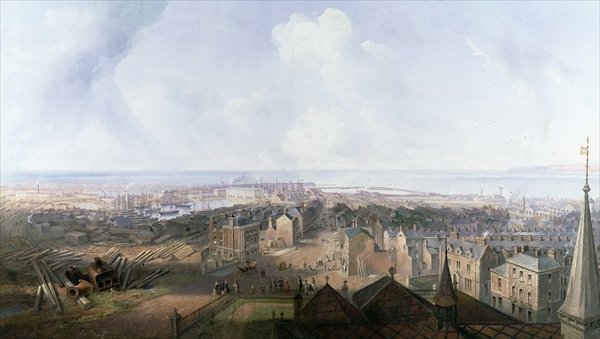Description
In the vastness of the artistic production of the nineteenth century, the work "West Hartlepool in the year 1859" by John Wilson Carmichael stands out as a pictorial testimony of the industrial era in England. John Wilson Carmichael, famous for his ability to capture the maritime and port essence, gives us a window to a specific time and place: the industrial vitality of the port of West Hartlepool in full apogee of the nineteenth century.
When observing this work, the first thing that attracts attention is the meticulous attention to detail. Carmichael presents a vivid and dynamic scene of daily activity in the port. In the foreground, a bustle of ships and boats in various shapes and sizes seems to dance on the waters of the port. The difference in the structure and design of the ships suggests a variety of functions and backgrounds, from small fishing boats to majestic merchant sails. Carmichael manages to immortalize the frantic rhythm of port life, a distinctive characteristic of industrial England of the time.
The domain of the composition in this piece not only lies in the fluid arrangement of ships and water, but also in the way in which light and color are used. The atmosphere full of activity is accentuated with a predominantly terrious and bluish palette, reflecting both the maritime nature of the port and the omnipresence of the industrial smoke that rises from the chimneys on the horizon. The sky, with its diffuse clouds, seems to merge with smoke, creating a veil that encapsulates the scene in an ethereal mist.
The characters that inhabit this scene are anonymous workers, captured in the middle of their daily work. These individuals contribute a human dimension to painting, underlining West Hartlepool's work and community essence. The way Carmichael presents them, perfectly integrated into the environment without defining them precisely, allows the viewer to feel both the presence and individual insignificance against the imposing industrial scenario.
A fascinating aspect of the work is how Carmichael manages to balance the detailed representation of the architectural and industrial elements with a harmonious global composition. The structure of the city and the port, with its buildings and cranes that rise in the background, are clear evidence of industrial progress. The artist not only documents a place, but also celebrates the transformation and dynamism that characterizes the Victorian era.
Carmichael, in his role as visual chronicler, offers us a pictorial story that transcends the merely aesthetic. Through "West Hartlepool in 1859," we are participants in a crucial chapter in the industrial history of England. The precision in the details, the chromatic choice, and the global composition make this work a representative example of the industrial and maritime art of the nineteenth century.
This painting Not only is it a representation of an activity, but also a mirror that reflects the essence of an era marked by change and modernization. John Wilson Carmichael, faithful to his style, combines the majesty of the sea with the intensity of human life and industrial innovation, consolidating himself as one of the most prominent exponents in maritime painting of his time.
KUADROS ©, a famous paint on your wall.
Hand-made oil painting reproductions, with the quality of professional artists and the distinctive seal of KUADROS ©.
Art reproduction service with satisfaction guarantee. If you are not completely satisfied with the replica of your painting, we refund your money 100%.

